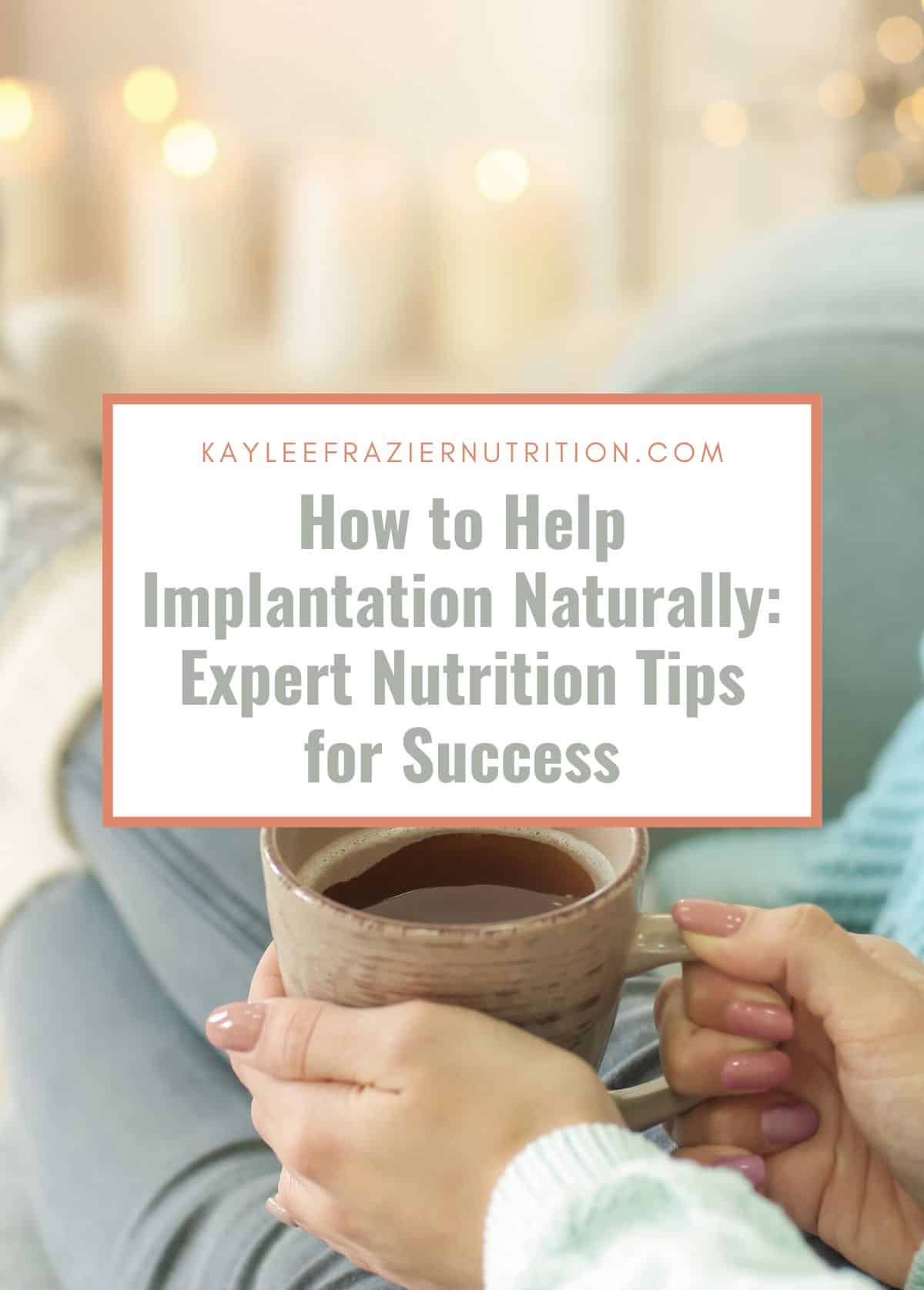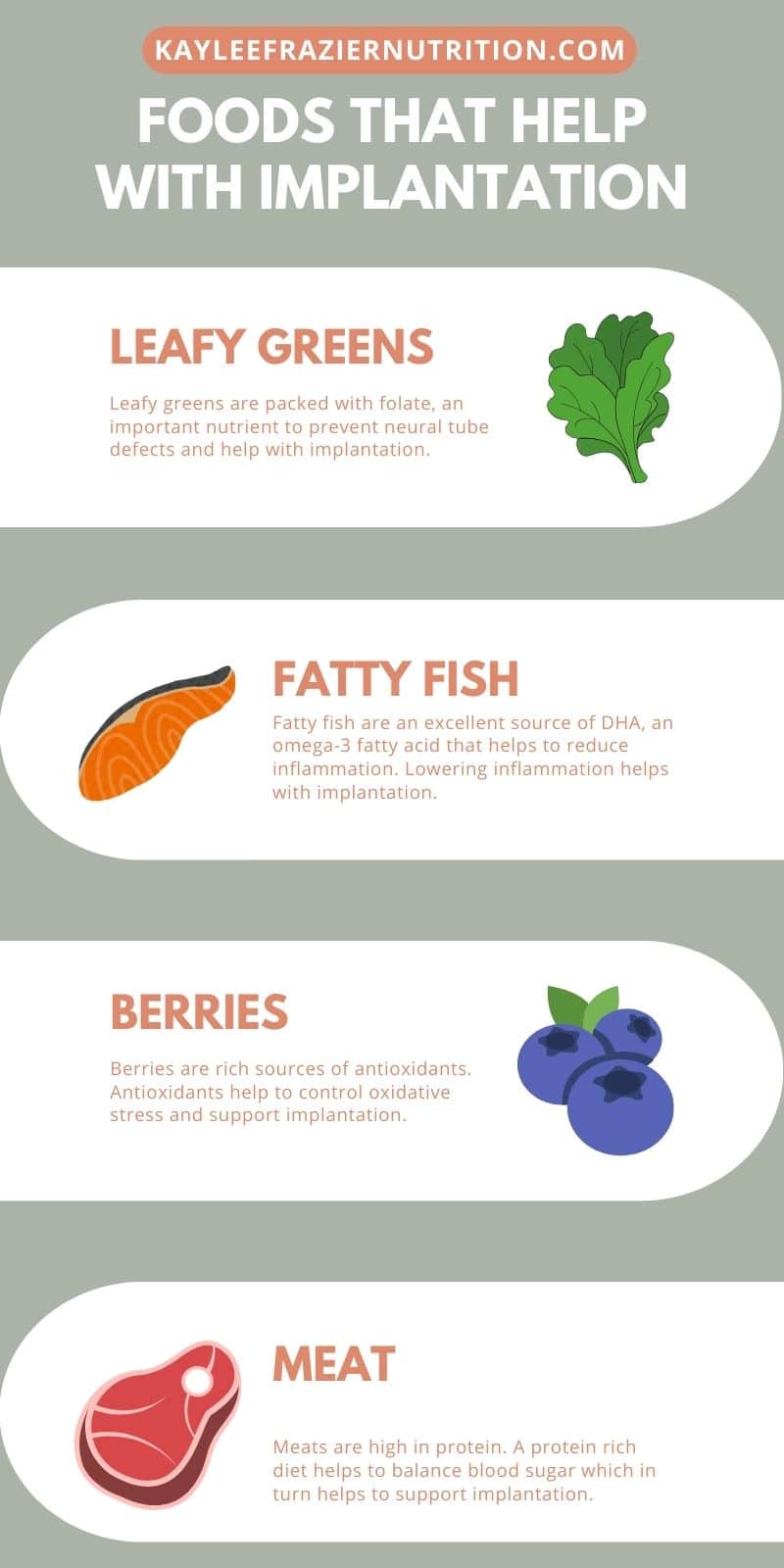Are you in the two week wait? It’s too soon to take a pregnancy test but you’re going crazy wondering what’s going on in there.
Is this the month you’ll finally see those two pink lines?
While you wait, it’s natural to wonder if there is anything you can do to help with implantation.
That’s what we are going to cover here! In this comprehensive article, we’ll discuss diet tips for the 2 week wait that can help with implantation.
Let’s get started!

What is implantation?
Before we talk about what you can do to help implantation, let’s make sure we are on the same page about what implantation is.
When you ovulate, an egg is released from the ovary into the fallopian tube. If sperm are present, one lucky swimmer will penetrate that egg to fertilize it. This is called fertilization.
At this point, the fertilized egg (now officially called a blastocyte) travels from the fallopian tube to the uterus where it attaches to the uterine wall (called the endometrium). After attaching to the uterine wall, the blastocyte is now called an embryo. This process is called implantation.
The journey from fertilization to implantation usually takes 6-10 days. And it isn’t until after implantation that a pregnancy officially begins, hCG starts being produced, and you can see a positive pregnancy test result.
What can you do to help implantation?
And while this magic is happening in your uterus, you are patiently waiting and wondering what you can do to help the process of implantation along.
Let’s talk about FOUR things you can do in the 2 week wait to help with implantation.
Eat enough calories
The first thing you can do is to simply eat enough calories. It sounds simple, because it is simple. But sometimes the most basic things can make the biggest difference.
Calorie restriction can reduce important hormone levels, specifically progesterone and estrogen (1). These hormones, especially progesterone, are super important to maintaining the early days of pregnancy.
Make sure you are eating regularly throughout the day. This might mean 2-3 meals per day in addition to 2-3 well-timed snacks.
Blood sugar balance
Numerous studies have shown that women who consume the highest amount of sugar and refined carbohydrates are overall less likely to conceive compared to those with lower sugar intake (2).
And, maintaining healthy blood sugar levels in the early days of pregnancy not only helps with implantation. But it can also help to reduce the risk of early miscarriage (3) and birth defects (4).
This is because the mother’s blood glucose levels pass directly to the developing baby. High blood sugar levels can damage the early development of the baby and lead to miscarriage or birth defects (5).
There are two main things to keep in mind when thinking about blood sugar control. The first is to minimize your intake of sugar, sugar sweetened beverages, and refined carbohydrates. Generally, just trying to eat less sugary foods.
The second is to balance meals. This means including plenty of protein and fat at meals along with modest portions of fiber-containing carbohydrates. Having balanced meals helps to keep blood sugar stable, which is ideal.
Reduce inflammation
Excessive inflammation from environmental factors, such as food choices or smoking, can reduce the odds of conception and pregnancy. This is because inflammation has negative effects on egg quality and implantation.
Specifically, chronic inflammation can alter the uterine environment, making it nearly impossible for the egg to properly imbed in the endometrial lining (6).
You can help to reduce inflammation by eating a diet rich in certain nutrients including antioxidants, omega-3 fatty acids, and dietary fiber. All while reducing your intake of sugar and processed foods (7).
Eat nutrients for early development
Another important thing you can do during the 2 week wait is to focus on nutrients that will fuel the early development of a fetus.
While fetal development isn’t happening yet, it is next up after implantation. In fact, most major organ systems are differentiated by the 8th week of pregnancy. And most women don’t get that positive pregnancy test until they are considered 4-5 weeks pregnant.
With so much important development happening early on, you can focus on key nutrients that support this process. Nutrients crucially important to early fetal development include folate, choline, vitamin B12, iron, vitamin A, and inositol (8).
We’ll talk about some foods that include these nutrients in the next section.
What foods help with implantation?
You may be thinking that all this sounds great. But, wondering specifically what you should eat?
Before I get into specific foods to include during implantation, I want to reiterate that you’ll first want to focus on eating enough overall calories while keeping your blood sugar balanced. These two things are cornerstone and can’t be ignored.
Ok, now onto the foods you can eat to provide important nutrients that can help with implantation. These are foods you’ll want to focus on including during the 2 week wait, but honestly they are perfect to include all the time:
Leafy greens
Spinach, romaine lettuce, kale, collard greens – these are all examples of leafy greens that are a rich source of folate. Folate is extremely well known for its role in preventing neural tube defects.
But more recently, folate deficiency has been linked with implantation failure (9). Just another reason to make sure you eat plenty of folate while trying to get pregnant.
Fatty fish
Salmon, mackerel, sardines, and herring are all great sources of omega-3 fatty acids. Omega-3 fatty acids are known to reduce inflammation and women with higher intakes are generally more likely to conceive compared to women with lower intakes (9).
A general goal is to consume about 2 servings of fatty fish per week. And if you are unable to do this regularly, include a high quality omega-3 supplement daily.
Berries
The deep colors in berries are potent sources of antioxidants. Antioxidants help to control oxidative stress, which when left unchecked can be damaging to your reproductive system and reduce the odds of conception (10).
Including a small handful most days of the week is a great way to boost antioxidants in your diet. You can enjoy fresh or frozen and still reap the benefits of all the antioxidants.
Meats
Meats are a great source of protein, which as mentioned earlier help with blood sugar balance. This alone is an excellent reason to include plenty of meat in your diet during your 2 week wait.
But meat is also a rich source of some key fertility nutrients, namely zinc, iron, vitamin B12, and vitamin A. And even more, nutrients available in meats and animal products tend to be in the most bioavailable forms. This means they are more easily absorbed and utilized.
If you are able, aim to include at least a couple servings of meat, poultry, and seafood daily.

What to avoid during the 2 week wait?
Of course, there are a few things you’ll want to avoid in the 2 week wait. Alcohol, high sugar foods, and caffeine are a few of the things you’ll want to reduce when trying for a pregnancy. These items reduce the odds of implantation and certainly don’t nourish a healthy pregnancy.
Alcohol
Alcohol is known to cause birth defects and there is no safe level of alcohol consumption during pregnancy. While in the 2 week wait, it’s best to treat your body as if it were pregnant. So, avoiding alcohol all together is really the best and safest option.
Additionally, research agrees that regular alcohol intake is not beneficial for fertility. One study found that women who consumed 4 or more alcoholic drinks per week were more than twice as likely to have a miscarriage (11).
High sugar foods
In this article, we’ve talked several times about the importance of blood sugar balance during the 2 week wait and how erratic blood sugar can negatively affect implantation.
So, it is really no surprise that high sugar food items should be avoided during the 2 week wait. This includes sugary beverages, high sugar snacks, and the like.
Now, if you are really itching for something sweet, just make sure to pair it with a high protein partner to help minimize the effect on your blood sugar. For example, enjoy a spoonful of peanut butter with a sprinkle of chocolate chips or a small candy bar with a handful of nuts.
Caffeine
Excessive caffeine intake can hurt implantation chances and increase risk of later pregnancy complications.
One study looked at implantation rates in mice that were treated with various doses of caffeine. They found that the mice with higher caffeine intake levels were more likely to have lower implantation rates (12).
But before you go cold turkey on caffeine, note that these studies looked at consuming the equivalent of 6-12 cups of coffee per day (13). If you keep your caffeine intake to less than 200 mg (or about two 8 oz cups) per day you should be totally fine.
When to get started
While taking care of your body during the implantation stage is important, the biggest way you can support implantation really starts a lot sooner.
The quality of the egg and sperm are big players in the odds of implantation. And it takes about 3-4 months of diet and lifestyle changes to see meaningful changes in egg and sperm quality.
Endometrial health is also a big component of implantation. But the endometrium largely develops before ovulation, during the follicular phase.
So, to see the biggest improvement in the odds of fertilization, making changes for several months before you plan to get pregnant will really provide the biggest and most impactful results.
Final Thoughts
During the 2 week wait, it is exciting and agonizing wondering what is happening inside your uterus and it is totally natural to wonder what you can do to help implantation along.
And while you may get the biggest benefit from making diet and lifestyle changes in the months before trying to get pregnant, there still is a lot you can do during the 2 week wait to help with implantation.
Some of the biggest things you can do to naturally help implantation is ensure you are eating adequate calories and keep your blood sugar balanced. You can also focus on including some nutrient dense foods that will benefit early fetal development. This means including foods such as leafy greens, fatty fish, berries, and meat.
Are you planning for a pregnancy? Check out my free preconception checklist – Countdown to Conception Roadmap. This roadmap will give you month by month priorities to help you prepare for a healthy pregnancy!
